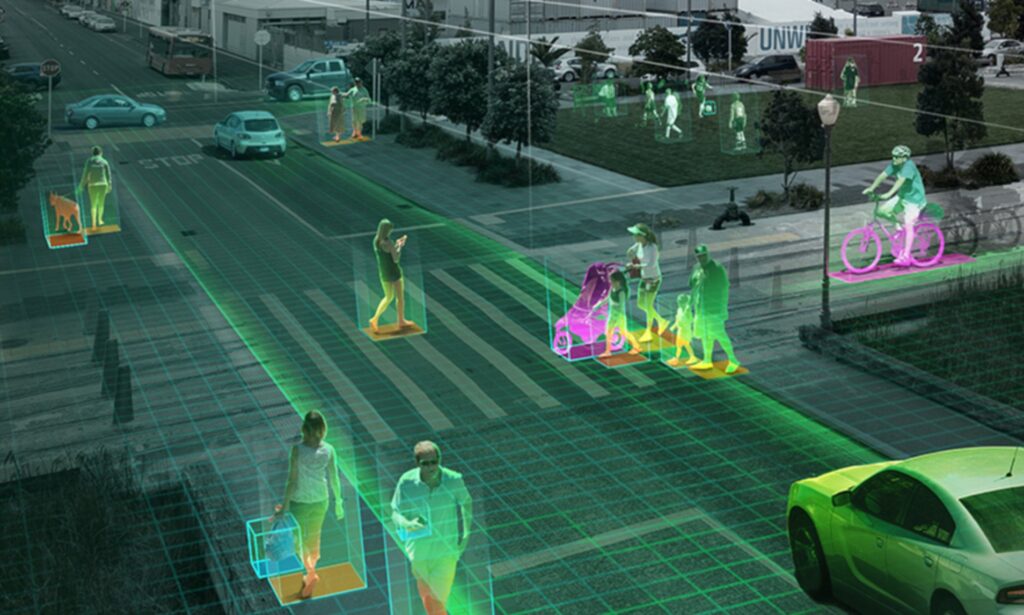In this post we will look at five ways AI transforms CCTV. In the realm of modern security, the integration of artificial intelligence (AI) with Closed-Circuit Television (CCTV) systems has ushered in a new era of surveillance. As a result traditional CCTV systems, characterized by passive video monitoring, have evolved into proactive and intelligent tools capable of enhancing safety and security across various domains. In this blog, we will delve into the fascinating world of AI in CCTV, exploring its applications, benefits, challenges, and the potential it holds for the future.
AI in CCTV: A Marriage of Technology and Security
The integration of AI in CCTV is a powerful fusion of cutting-edge technology and security needs. For instance AI algorithms, often powered by machine learning and computer vision, enable CCTV systems to go beyond mere video recording and playback. Here’s how AI transforms conventional CCTV systems:
- Object Recognition and Tracking: AI-driven CCTV can recognize and track objects or individuals in real-time. This capability is invaluable for identifying suspicious activities or tracking the movements of people and vehicles within a monitored area. Law enforcement agencies, for instance, can use this technology to swiftly respond to criminal incidents.
- Anomaly Detection: AI can analyze video feeds and identify unusual or anomalous behavior. This could be as simple as detecting a person loitering in a restricted area or as complex as recognizing a fight breaking out in a crowd. Such real-time alerts enable proactive intervention, improving overall security.
- Facial Recognition: AI-powered facial recognition technology has gained widespread attention. It enables CCTV systems to match faces against databases of known individuals, enhancing access control and aiding in identifying suspects in criminal investigations. However, ethical concerns around privacy and misuse have also surfaced.
- License Plate Recognition: AI-equipped CCTV cameras can read and recognize license plates, making them invaluable in traffic management, toll collection, and tracking stolen vehicles. This technology helps automate tasks that were once labor-intensive.
- Predictive Analysis: By analyzing historical data, AI can predict potential security threats and trends. This proactive approach allows for preemptive security measures, making it particularly useful in critical infrastructure protection.
Benefits of AI in CCTV
The integration of AI into CCTV systems brings several notable benefits to the table:
- Enhanced Security: AI-driven CCTV is proactive, capable of identifying threats in real-time. This leads to faster response times, reducing the risk of incidents.
- Cost-Efficiency: Automation and predictive analysis help optimize resource allocation. For example, law enforcement agencies can deploy personnel more effectively, resulting in cost savings.
- Improved Accuracy: AI algorithms can process vast amounts of data with high accuracy, reducing the chances of false alarms and errors.
- Time Savings: AI-powered video analytics can process hours of footage in mere minutes, saving time and effort in reviewing recordings.
- Data-Driven Insights: The data generated by AI in CCTV systems can be used for business intelligence, traffic management, and urban planning, among other applications.
Challenges and Ethical Considerations
While the potential benefits of AI in CCTV are clear, it also presents a range of challenges and ethical considerations:
- Privacy Concerns: The use of facial recognition technology and the constant monitoring of public spaces have raised serious privacy concerns. Striking the right balance between security and privacy is a complex challenge.
- Bias and Discrimination: AI algorithms can inherit biases from the data they are trained on, potentially leading to discriminatory outcomes, especially in facial recognition. Ensuring fairness and equity in AI systems is crucial.
- Data Security: As AI-driven CCTV systems collect vast amounts of data, securing this data from breaches and misuse becomes paramount. Unauthorized access to surveillance footage can have severe consequences.
- Regulation and Compliance: The rapidly evolving nature of AI technology makes it challenging for regulators to keep up with its implications. Stricter regulations and guidelines are needed to govern its use.
The Future of AI in CCTV
The future of AI in CCTV holds immense promise. Here are some exciting developments and potential applications to look out for:
- Autonomous Surveillance: AI-powered drones equipped with cameras could perform autonomous surveillance tasks, enhancing the reach and effectiveness of security systems.
- Smart Cities: As urban areas grow, the demand for intelligent surveillance systems will rise. AI-powered CCTV will play a pivotal role in creating safer and more efficient smart cities.
- AI-Enhanced Emergency Response: Integrating AI with emergency response systems could enable faster and more accurate dispatch of resources to incidents, potentially saving lives.
- Customizable Solutions: AI in CCTV will become more customizable, allowing organizations to tailor their surveillance systems to specific needs and scenarios.
- Quantum Computing: As quantum computing matures, it could significantly boost the capabilities of AI in CCTV by processing vast datasets even faster, leading to more accurate and advanced analytics.
Conclusion
The integration of AI into CCTV systems is a significant leap forward in the realm of security and surveillance. It offers the potential for enhanced safety, efficiency, and data-driven insights. However, it also poses ethical and privacy challenges that must be carefully addressed. As technology continues to advance, the future of AI in CCTV promises to redefine how we approach security in our increasingly interconnected world. Balancing these advancements with the preservation of individual rights and freedoms will be the key to realizing the full potential of AI in CCTV.
Talk to Teltrac today about what AI can do for your CCTV system.

